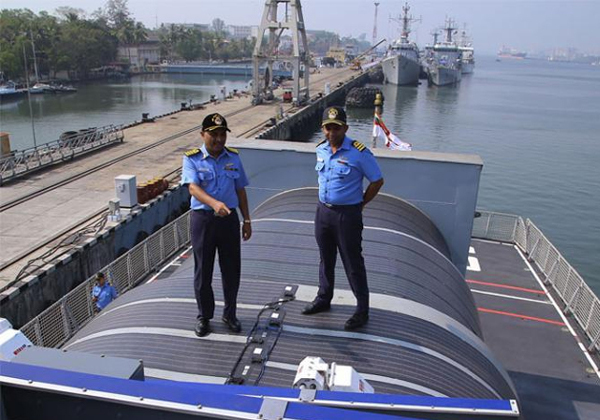The Navy is pressing ahead with its eco-friendly programme, the Indian Navy Environment Conservation Roadmap (INECR) that comprises specific action plans covering the gamut of operations, maintenance, administration, infrastructure and community living, the service said in a statement on Environment Day.
“The roadmap envisions ‘reduction in energy consumption’ and ‘diversification of energy supply’ as the key result areas,” the Navy said. Under the INECR, numerous policies aimed at reduction of energy consumption and environment sustenance have been formulated and disseminated to all ships, as well as shore establishments, it added.
“As a progressive step, Indian Navy has pledged 1.5% of its ‘Works’ budget towards renewable energy generation,” the Navy stated. Solar photovoltaic (PV) projects has been one of the focus areas of the Navy since the inception of the INECR and 24 MW of Solar Photo Voltaic (PV) projects consisting of both rooftop and land-based solar panels are under execution at various shore establishments of the Navy under the Jawaharlal Nehru National Solar Mission (JNNSM).
Pilot projects utilizing wind or a mix of both solar and wind (hybrid) are also being taken up progressively which would not only reduce the carbon footprint but also help achieve self-sustenance in energy security, the Navy said.
To promote use of biodiesel, the Navy said that plans were afoot to replace High Speed Diesel (HSD) (annual usage of 6,300 kL) with B5 blend of HSD. This would result in a direct savings of 5% of HSD, which translates to approximately 315 kL annual savings of HSD, the Navy said in the statement. The project to blend HSD is set to start at Visakhapatnam in the coming months.
Afforestation drives at Naval stations, under which more than 18,000 plants have been planted over the past one year, would mitigate an estimated 365 tonnes of CO2 emissions.
Other measures being propagated include promoting renewable energy usage on all bases and ships, segregated waste collection and improved waste management techniques. “An estimated savings of 140 LPG cylinders per year is accrued through implementation of biogas plants using bio-degradable waste and organic waste converters across naval units,” the Navy added.
Source: TH
Image Courtesy:Planet Custodian
You may also like
-
IAF Aircraft Set Course For Exercise Eastern Bridge VII At Oman
-
IAF Set To Host The Indian Defence Aviation Exposition-II At Jodhpur
-
Defence Secretary to co-chair 5th India-Philippines Joint Defence Cooperation Committee meeting in Manila
-
Simultaneous Launch Of ‘malpe And Mulki’, Fourth And Fifth Ships Of Asw Swc (Csl) Project
-
Aatmanirbharta in Defence: MoD signs Contract with HAL for 240 AL-31FP Aero Engines for Su-30MKI Aircraft
